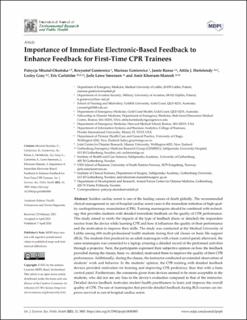| dc.contributor.author | Misztal-Okońska, Patrycja | |
| dc.contributor.author | Goniewicz, Krzysztof | |
| dc.contributor.author | Goniewicz, Mariusz | |
| dc.contributor.author | Ranse, Jamie | |
| dc.contributor.author | Hertelendy, Attila J. | |
| dc.contributor.author | Gray, Lesley J. | |
| dc.contributor.author | Carlström, Eric | |
| dc.contributor.author | Sørensen, Jarle Løwe | |
| dc.contributor.author | Khorram-Manesh, Amir | |
| dc.date.accessioned | 2022-02-24T10:13:26Z | |
| dc.date.available | 2022-02-24T10:13:26Z | |
| dc.date.created | 2021-04-08T14:31:01Z | |
| dc.date.issued | 2021 | |
| dc.identifier.citation | Misztal-Okońska, P., Goniewicz, K., Goniewicz, M., Ranse, J., Hertelendy, A. J., Gray, L., Carlström, E., Løwe Sørensen, J. & Khorram-Manesh, A. (2021). Importance of Immediate Electronic-Based Feedback to Enhance Feedback for First-Time CPR Trainees. International Journal of Environmental Research and Public Health, 18(8), Artikkel 3885. | en_US |
| dc.identifier.issn | 1661-7827 | |
| dc.identifier.uri | https://hdl.handle.net/11250/2981156 | |
| dc.description.abstract | Sudden cardiac arrest is one of the leading causes of death globally. The recommended clinical management in out-of-hospital cardiac arrest cases is the immediate initiation of high-quality cardiopulmonary resuscitation (CPR). Training mannequins should be combined with technology that provides students with detailed immediate feedback on the quality of CPR performance. This study aimed to verify the impacts of the type of feedback (basic or detailed) the responders receive from the device while learning CPR and how it influences the quality of their performance and the motivation to improve their skills. The study was conducted at the Medical University of Lublin among 694 multi-professional health students during first aid classes on basic life support (BLS). The students first practiced on an adult mannequin with a basic control panel; afterward, the same mannequin was connected to a laptop, ensuring a detailed record of the performed activities through a projector. Next, the participants expressed their subjective opinion on how the feedback provided during the classes, basic vs. detailed, motivated them to improve the quality of their CPR performance. Additionally, during the classes, the instructor conducted an extended observation of students’ work and behavior. In the students’ opinion, the CPR training with detailed feedback devices provided motivation for learning and improving CPR proficiency than that with a basic control panel. Furthermore, the comments given from devices seemed to be more acceptable to the students, who did not see any bias in the device’s evaluation compared to that of the instructor. Detailed device feedback motivates student health practitioners to learn and improve the overall quality of CPR. The use of mannequins that provide detailed feedback during BLS courses can improve survival in out-of-hospital cardiac arrest. | en_US |
| dc.language.iso | eng | en_US |
| dc.rights | Navngivelse 4.0 Internasjonal | * |
| dc.rights.uri | http://creativecommons.org/licenses/by/4.0/deed.no | * |
| dc.title | Importance of Immediate Electronic-Based Feedback to Enhance Feedback for First-Time CPR Trainees | en_US |
| dc.type | Peer reviewed | en_US |
| dc.type | Journal article | en_US |
| dc.description.version | publishedVersion | en_US |
| dc.rights.holder | © 2021 by the authors. | en_US |
| dc.source.volume | 18 | en_US |
| dc.source.journal | International Journal of Environmental Research and Public Health (IJERPH) | en_US |
| dc.source.issue | 8 | en_US |
| dc.identifier.doi | https://doi.org/10.3390/ijerph18083885 | |
| dc.identifier.cristin | 1903012 | |
| dc.source.articlenumber | 3885 | en_US |
| cristin.ispublished | true | |
| cristin.fulltext | original | |
| cristin.qualitycode | 1 | |

